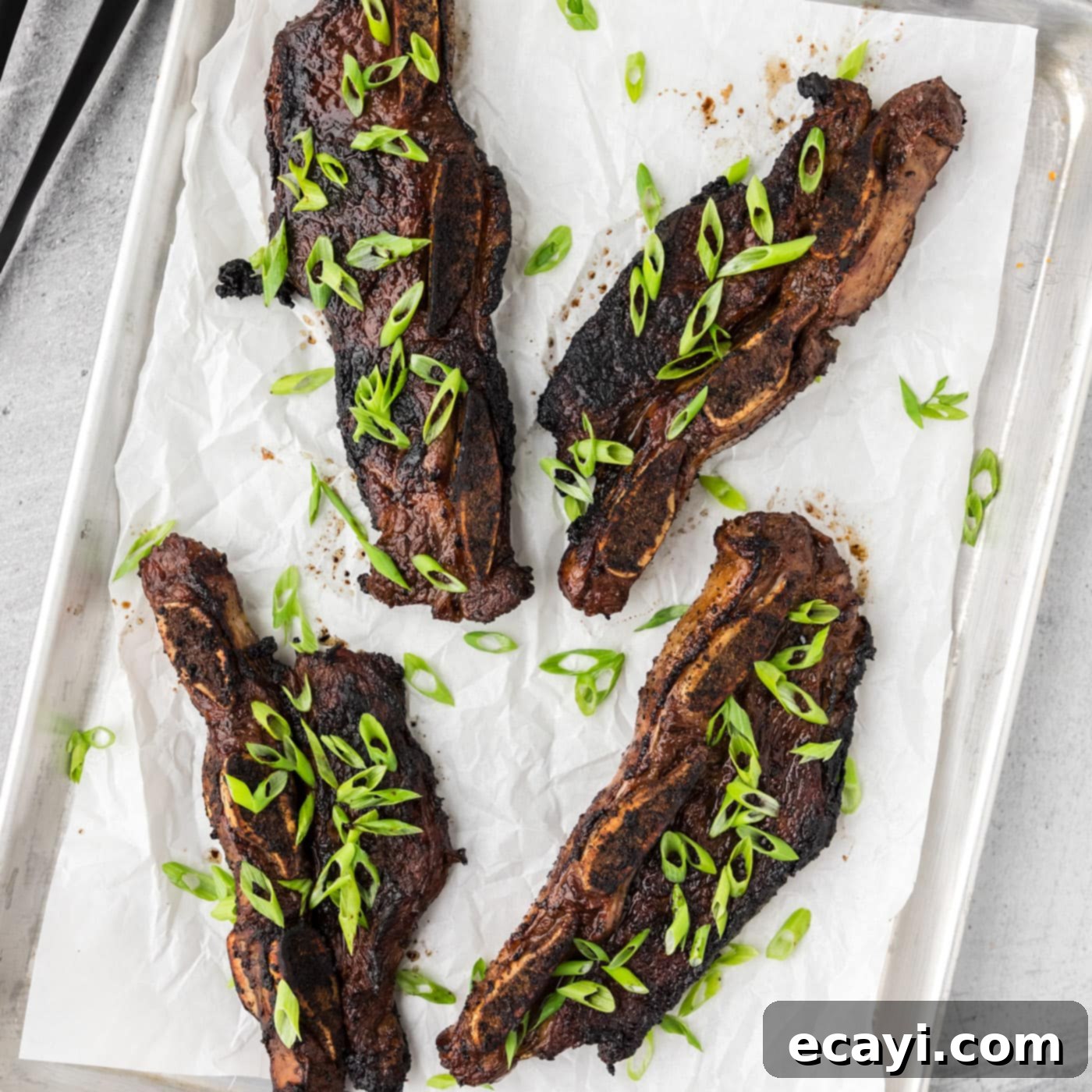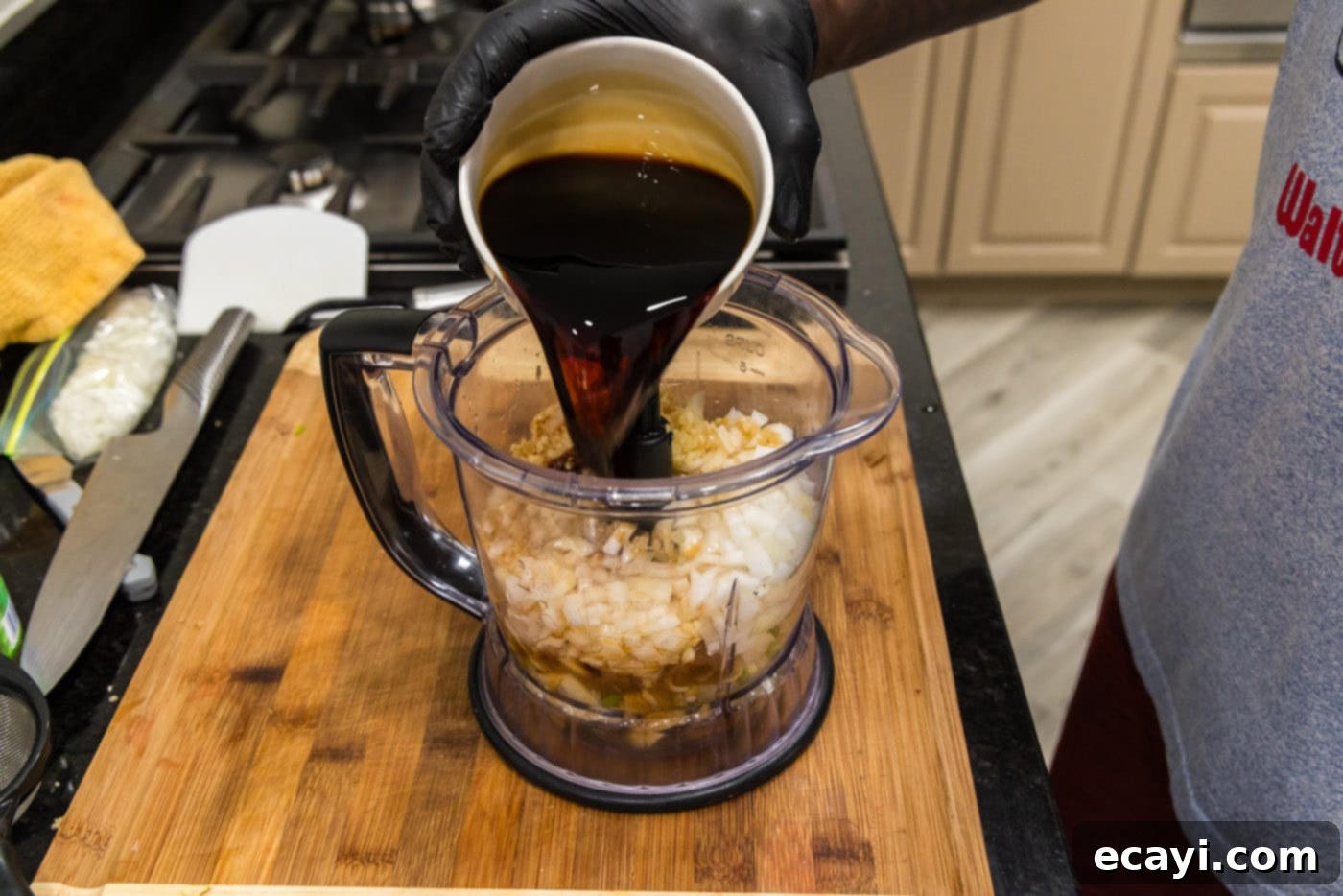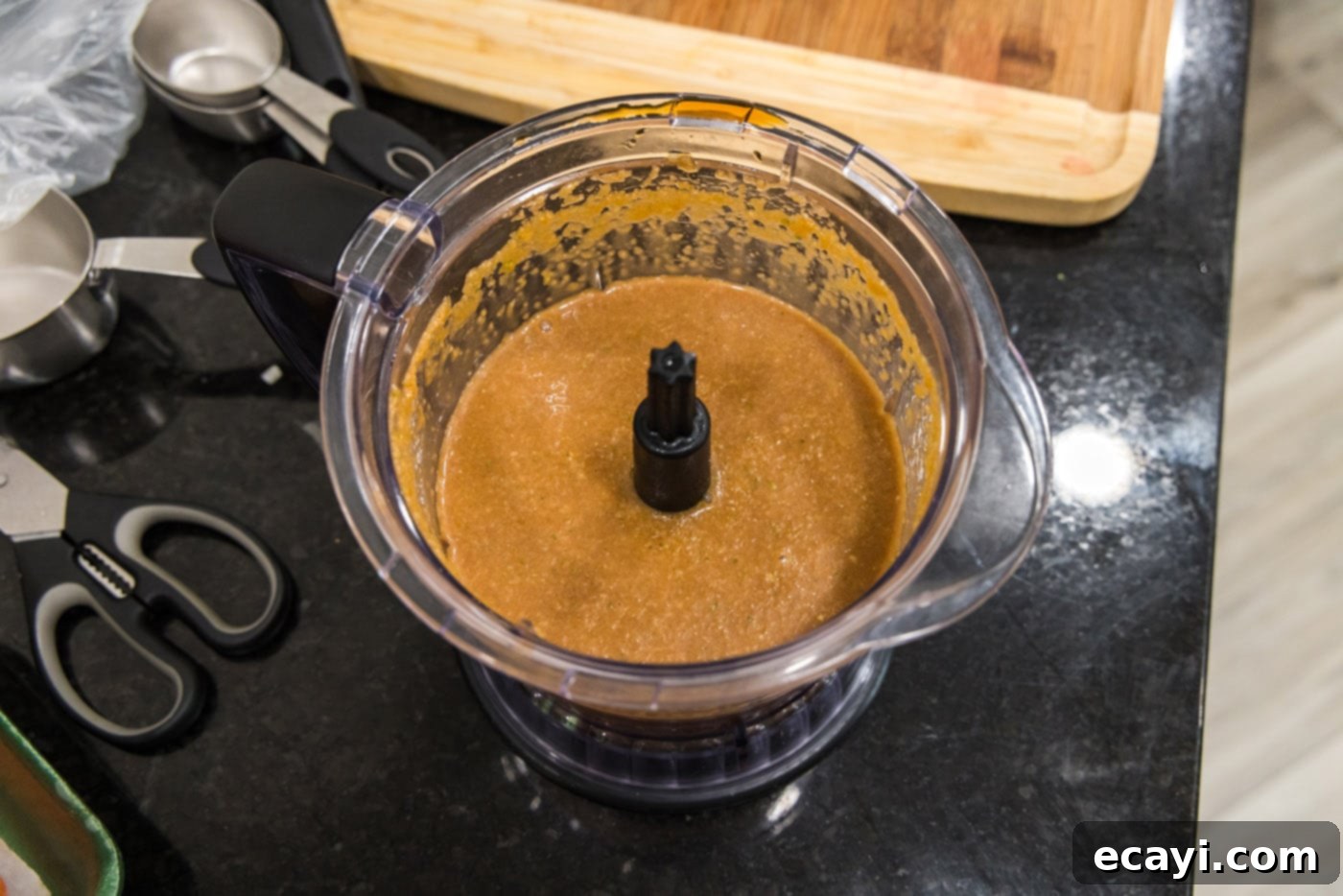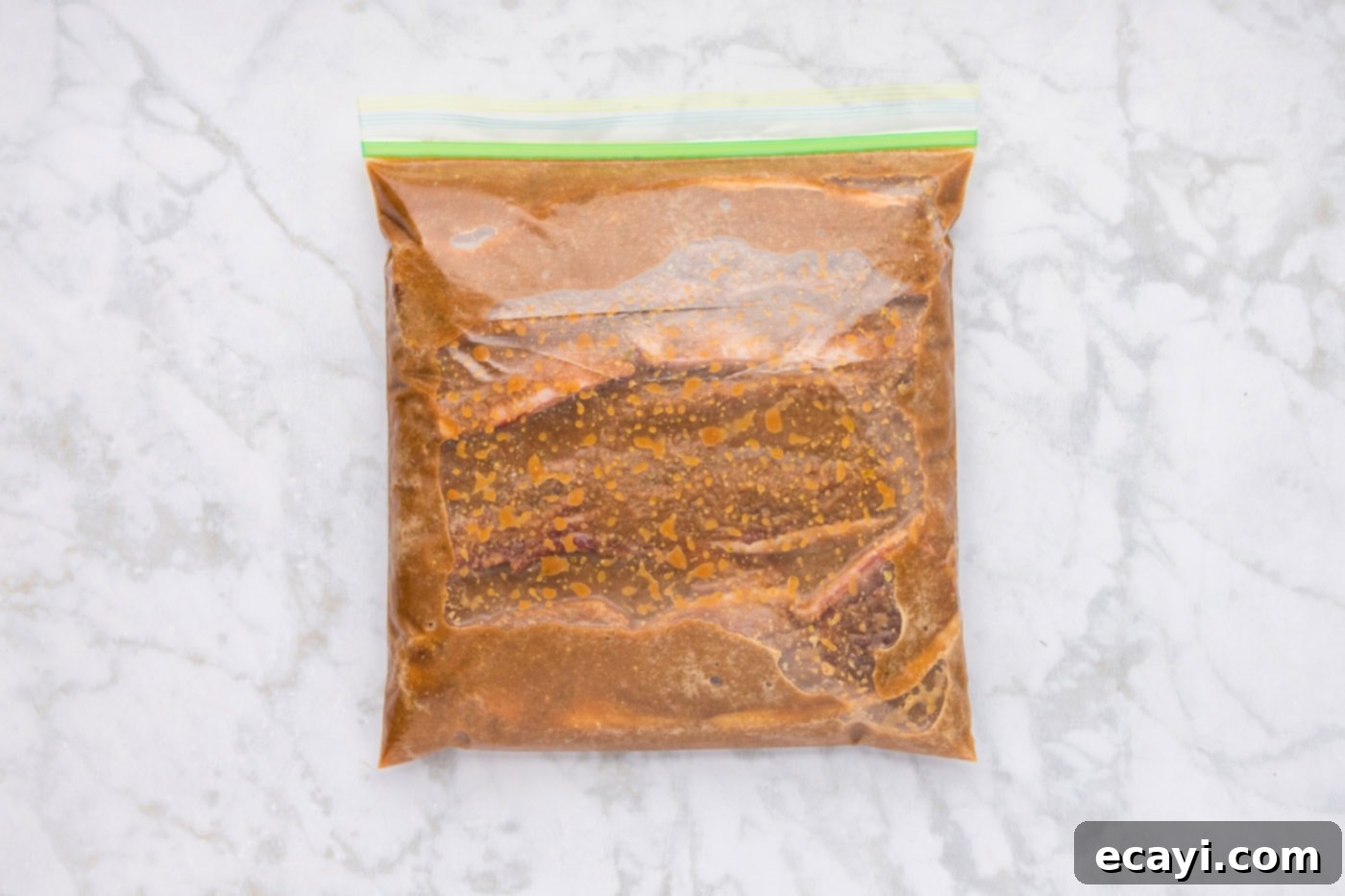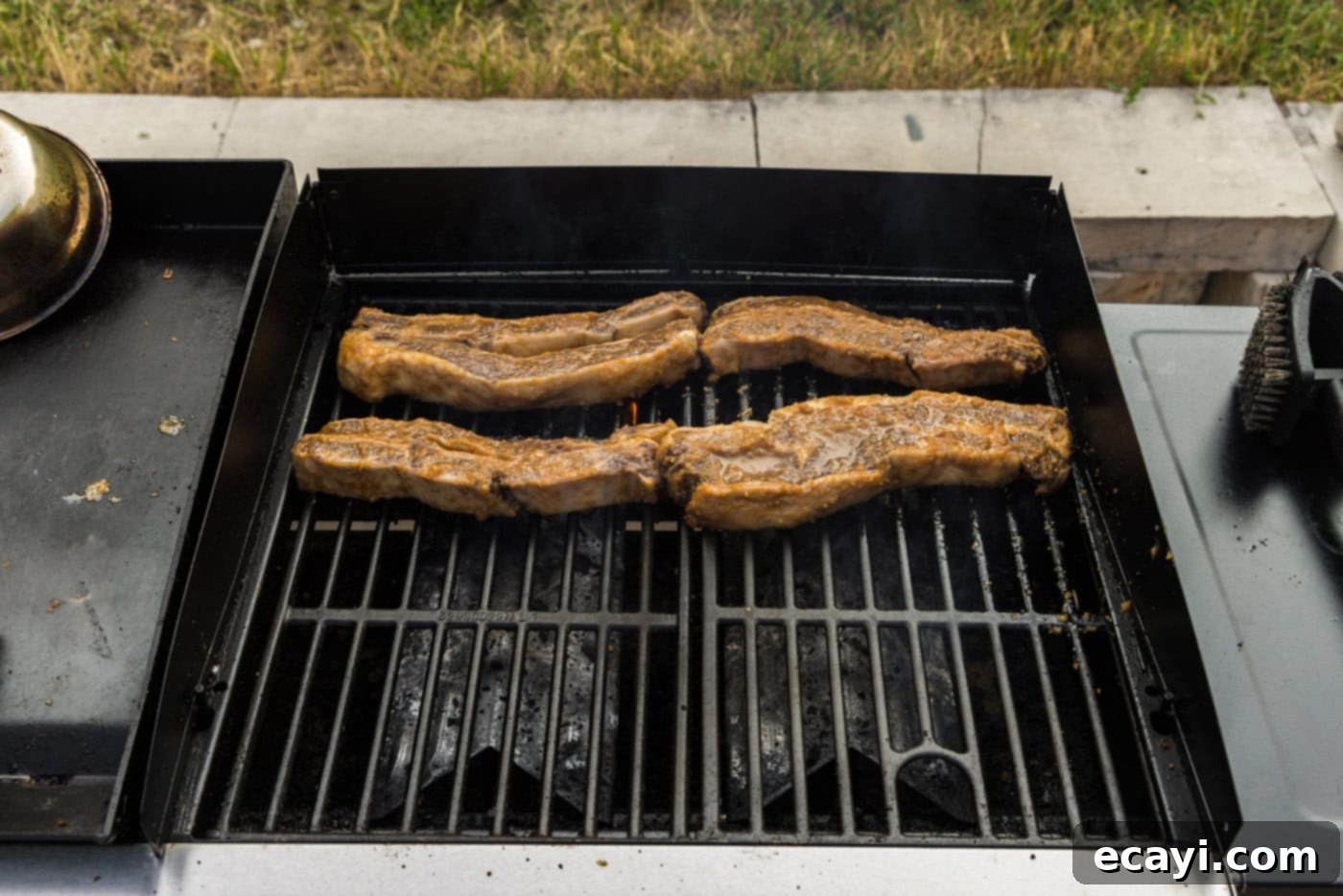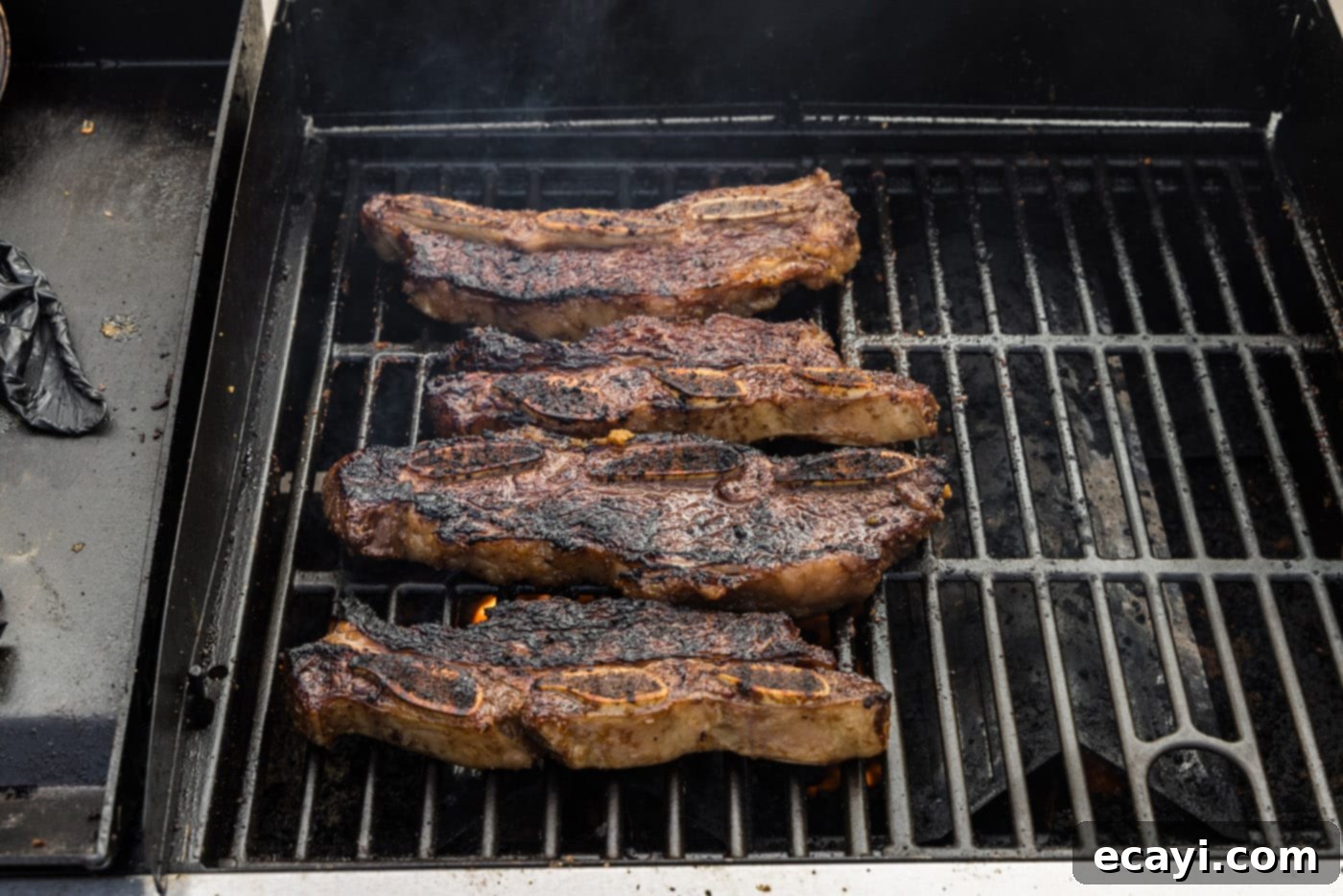Authentic Korean Short Ribs (Galbi/Kalbi) Recipe: Grilled to Perfection
Embark on a culinary journey to Korea right from your backyard grill with this incredible Korean Short Ribs recipe, famously known as Galbi or Kalbi. These succulent beef short ribs are not just marinated; they’re lovingly bathed overnight in a rich, harmonious blend of sweet and savory flavors. Imagine the deep umami of soy sauce perfectly balanced with the aromatic punch of garlic and onion, and the delicate sweetness and tenderizing power of fresh pears and brown sugar. After absorbing every exquisite note of this signature marinade, the ribs are expertly tossed onto a hot grill, where they caramelize beautifully and cook to an unparalleled tender perfection. Get ready to create a dish that’s a true celebration of Korean barbecue, delivering an unforgettable dining experience that’s easier to achieve than you might think.
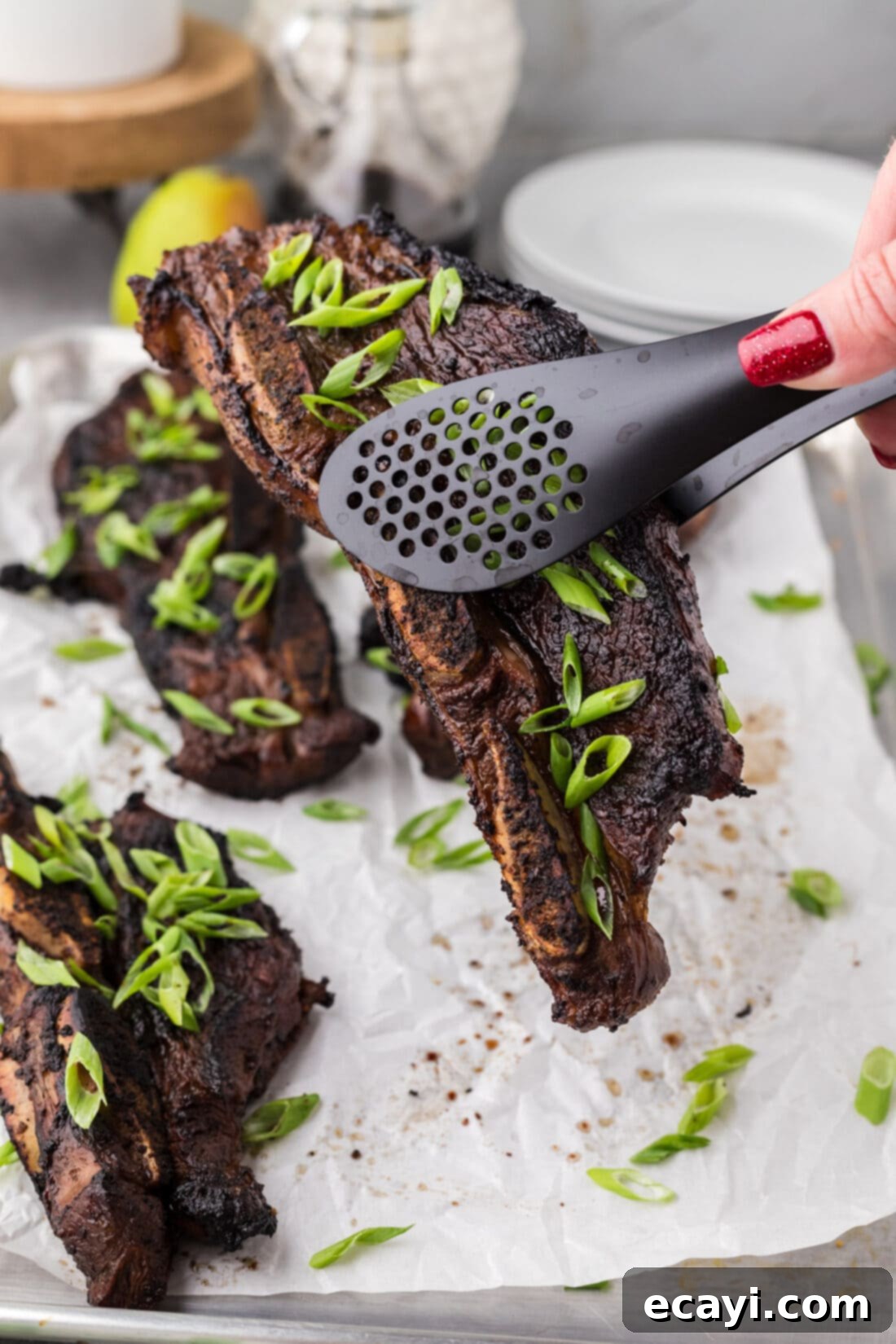
Why This Korean Short Ribs Recipe Works So Well
This particular Korean short ribs (Galbi or Kalbi) recipe stands out for several compelling reasons, making it a favorite for both novice and experienced home cooks. It masterfully highlights the inherent tender and juicy nature of beef short ribs, transforming them into an elevated barbecue experience with a distinct Asian flair. The key to its success lies in the specific cut of meat and the meticulously crafted marinade.
Unlike traditional thick-cut short ribs, authentic Korean Galbi utilizes thinly sliced beef cut across the bone, often referred to as “flanken style” ribs. This unique cutting technique increases the surface area of the meat, allowing the flavorful marinade to deeply penetrate every fiber. This ensures maximum flavor absorption and a remarkably tender texture that practically melts in your mouth.
The marinade itself is a powerhouse of flavor and a natural tenderizer. Ingredients like fresh pear contain enzymes (like proteolytic enzymes) that naturally break down tough meat fibers, contributing significantly to the ribs’ tenderness. This, combined with the acidity of rice vinegar and the savory depth of soy sauce, creates a complex flavor profile that is both sweet and umami-rich. The overnight marination period is crucial, giving these ingredients ample time to work their magic, infusing the meat with moisture and taste.
Finally, the grilling method offers a quick and efficient way to cook these thinly sliced ribs to perfection. The high heat of the grill rapidly caramelizes the sugars in the marinade, forming a delicious, slightly charred crust while keeping the interior incredibly juicy. This combination of a unique cut, a potent marinade, and a swift grilling process ensures perfectly tender, intensely flavorful Korean short ribs every single time.
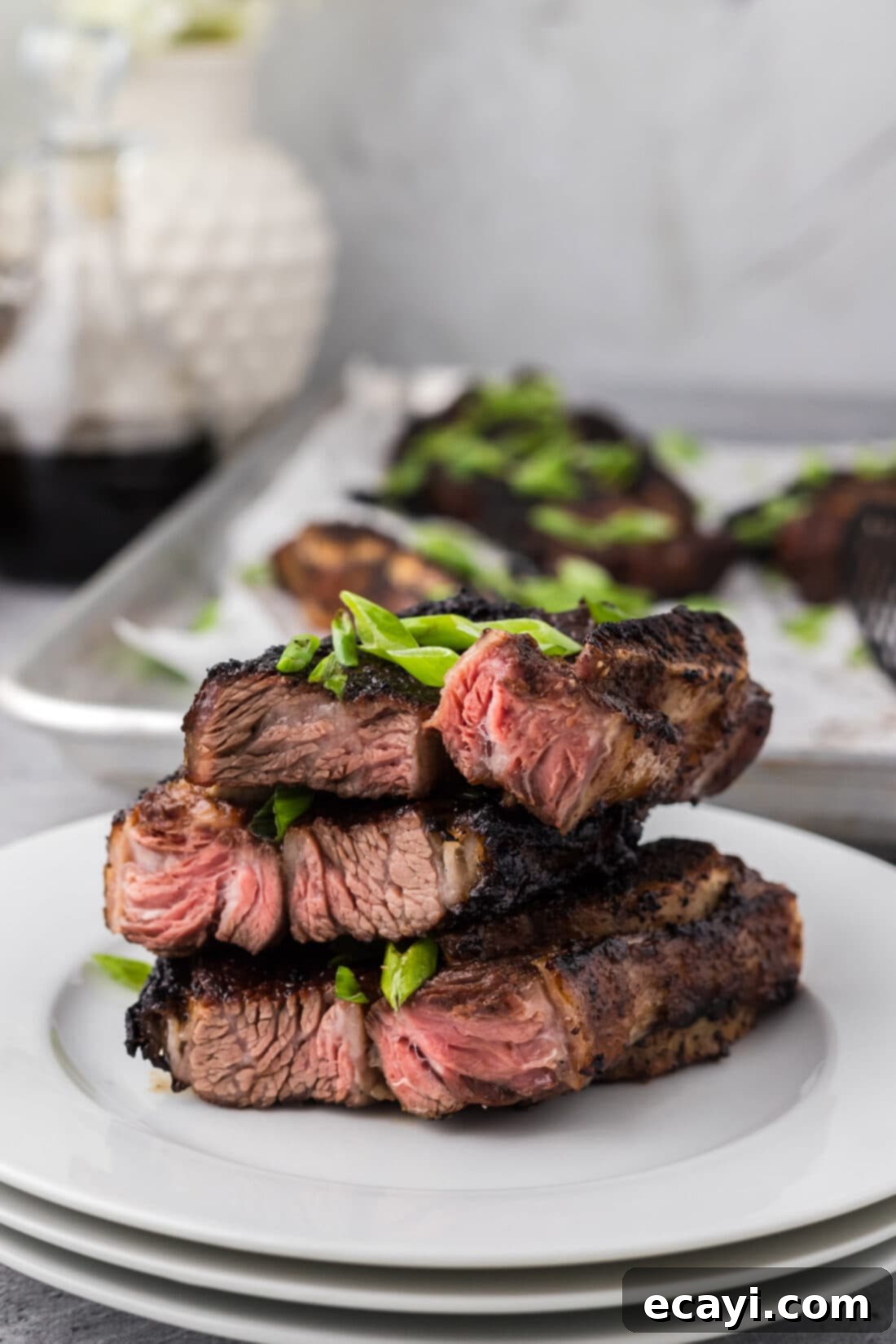
Essential Ingredients for Your Korean Short Ribs
To create the most authentic and delicious Korean Short Ribs, you’ll need a selection of fresh, high-quality ingredients for both the beef and the marinade. Every component plays a vital role in achieving that signature sweet, savory, and tender profile. You can find all specific measurements, detailed ingredients, and full instructions in the printable recipe card located at the very end of this comprehensive guide.
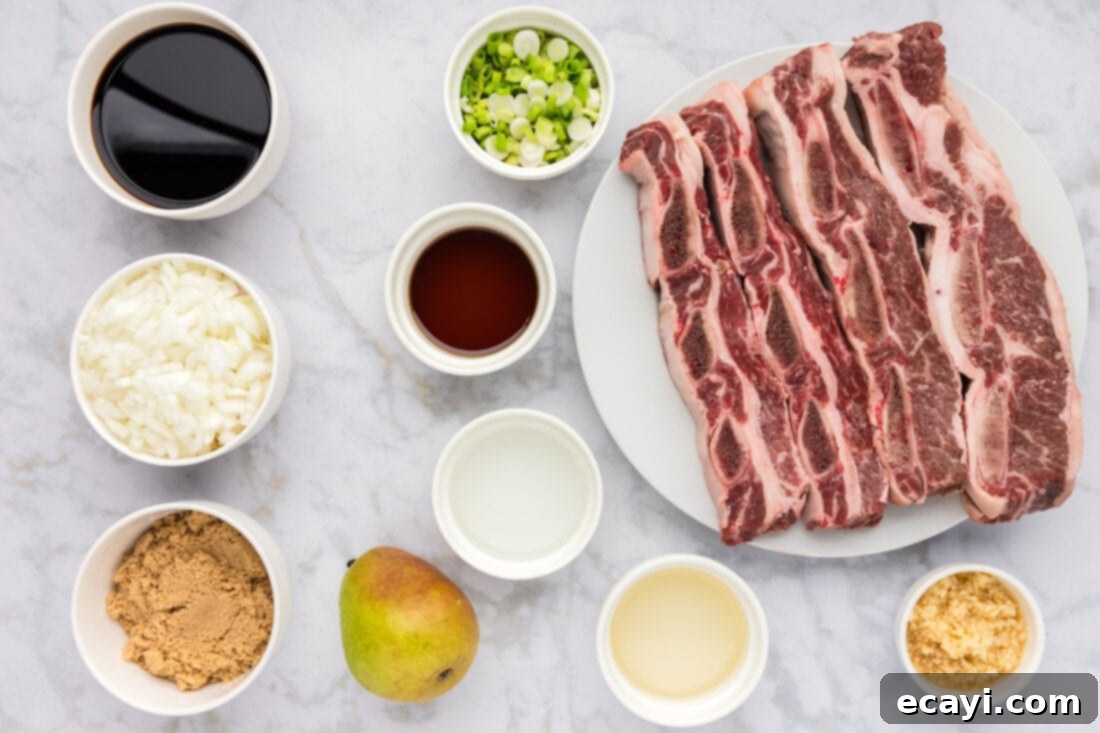
Ingredient Spotlight & Smart Substitutions
Understanding each ingredient’s role and knowing possible substitutions can elevate your cooking experience and ensure success even if a specific item isn’t available.
RIBS – For this recipe, you’ll need approximately 3 pounds of beef short rib strips. When shopping, look for cuts labeled “flanken ribs” or “flanken style short ribs.” This specific cut is crucial for traditional Galbi, as the meat is thinly sliced across the bones (usually 3-4 bones per strip). This allows for quick cooking on the grill and maximizes the surface area for the marinade to penetrate, resulting in that desirable tender and flavorful outcome. If you can’t find flanken style, ask your butcher to slice standard beef short ribs about 1/4 to 1/2 inch thick across the bone. The thinner the slice, the quicker it will cook and absorb flavor.
MARINADE – The marinade is the heart and soul of these Korean barbecue short ribs, delivering both iconic flavor and exceptional tenderness. Each ingredient is carefully chosen for its specific contribution:
- Pears: These are vital for tenderizing the meat. Korean pears (also known as Nashi pears or Asian pears) are traditionally used due to their high enzyme content and crisp, subtly sweet flavor. If Korean pears are unavailable, regular ripe pears (such as Bosc or Anjou) will work effectively. Just ensure they are ripe enough to blend smoothly. The pear enzymes naturally break down the connective tissues in the beef, making it incredibly tender.
- Soy Sauce: The foundation of the savory flavor, providing essential umami and saltiness. Opt for a good quality, low-sodium soy sauce if you are mindful of sodium intake, as you can always add more salt if needed.
- Sesame Oil: Adds a distinctive nutty aroma and flavor, which is a hallmark of Korean cuisine. Use toasted sesame oil for a more intense flavor profile.
- Rice Vinegar: Provides a subtle tang and helps balance the sweetness and richness of the other ingredients. It also contributes to the tenderizing process.
- Garlic: A generous amount of minced garlic is essential for its pungent, aromatic depth, a cornerstone of many savory Korean dishes.
- Green Onion (Scallions): We use the white ends for their mild onion flavor in the marinade, which becomes sweeter when blended. The green parts are typically reserved for garnish.
- White Onion: Adds another layer of sweet, pungent onion flavor to the marinade, mellowing out during the marination and cooking process.
- Brown Sugar: Provides sweetness that balances the savory soy sauce and helps with caramelization on the grill, creating that beautiful charred exterior. You can adjust the amount slightly based on your preference for sweetness.
- Water: Helps to thin out the marinade to an ideal consistency for blending and ensures even distribution over the ribs.
When preparing the marinade, blitz all these ingredients together in a blender or food processor until the mixture is completely smooth and no chunks remain. This ensures that the flavors are fully incorporated and the pear’s tenderizing enzymes are evenly distributed throughout the marinade, maximizing its effectiveness. This step is non-negotiable for achieving truly authentic and tender Korean short ribs.
Step-by-Step Guide: Crafting Your Own Korean Short Ribs
These step-by-step photos and detailed instructions are provided to help you visualize each stage of preparing this delicious recipe. For a convenient printable version of this recipe, complete with precise measurements and comprehensive instructions, please Jump to Recipe at the bottom of this post.
- Prepare the Flavorful Marinade: Begin by gathering all your marinade ingredients: soy sauce, sesame oil, rice vinegar, minced garlic, the white ends of green onions, coarsely chopped white onion, peeled and cored pear, brown sugar, and water. Carefully place all these components into a high-speed blender or a food processor. Process the mixture thoroughly until it is completely smooth and no visible chunks of fruit or onion remain. This ensures a consistent marinade that will deeply infuse your short ribs with flavor and tenderizing power. The smoothness is key for optimal penetration and an even coating.


- Marinate the Short Ribs: Take your thinly sliced beef short rib strips and carefully place them into a sturdy plastic gallon-sized zip-top bag. Pour the freshly prepared, smooth marinade over the ribs, ensuring all pieces are well coated. Seal the bag, pressing out as much air as possible. Gently massage the bag to distribute the marinade evenly around the ribs. Place the sealed bag in the refrigerator and allow the ribs to marinate for a minimum of 5 hours. For the absolute best flavor and tenderness, marinating overnight (for 10-12 hours) is highly recommended. The longer marination period allows the pear enzymes and savory liquids to truly work their magic, breaking down tough fibers and permeating the meat with an incredible depth of flavor.

- Prepare Your Grill: When you’re ready to cook, preheat your outdoor grill to medium-high heat, aiming for a temperature of around 375°F (190°C). Allow the grill grates to get thoroughly hot before placing any meat on them. This ensures a good sear and prevents sticking.
EXPERT TIP – To prevent the ribs from sticking and to achieve those perfect grill marks, it’s incredibly helpful to oil your grill grates. Achieve this safely by grasping a wadded-up paper towel with a pair of long-handled tongs. Dip the towel into a small amount of high-smoke-point oil (like olive oil, vegetable oil, or grapeseed oil). Carefully and quickly rub the oiled towel across your hot grill grates. This creates a non-stick surface without excessively smoking up your grill. Repeat this process for several passes to ensure good coverage.
- Grill to Tender Perfection: Once your grill is hot and oiled, remove the marinated short ribs from the bag, allowing any excess marinade to drip off (do not rinse the ribs). Place the rib strips directly onto the hot grill grates, ensuring not to overcrowd the grill. Cook the ribs for approximately 8-10 minutes on one side. Then, using tongs, flip each rib over to the other side. Cook for an additional 8-10 minutes. For more even cooking and to develop a beautiful, caramelized crust, you may find it beneficial to flip the ribs every 4-5 minutes during the total cooking time. The goal is a slightly charred exterior and a tender, juicy interior. The thinness of the flanken cut means these ribs cook relatively quickly. Remove from the grill and let them rest for a few minutes before serving.


Frequently Asked Questions & Expert Tips
Absolutely, making these Korean short ribs ahead of time is not only possible but highly recommended! The marinade needs time to penetrate the meat, infuse it with flavor, and allow the tenderizing enzymes from the pear to work. We suggest preparing the marinade and adding the short ribs the night before or the morning of the day you plan to cook them. This allows the flavors to fully develop and the meat to achieve optimal tenderness. However, it’s crucial not to let them marinate for excessively long periods (e.g., more than 24 hours), as the pear enzymes can begin to break down the meat fibers too much, leading to a mushy texture. Aim for a sweet spot of 5 hours up to overnight for the best results.
If you happen to have any delicious Korean short ribs leftover (a rare occurrence!), store them properly to maintain freshness. Allow the cooked ribs to cool completely to room temperature before transferring them to an airtight container. Keep the container sealed in the refrigerator for up to 3-4 days. To reheat, you can gently warm them in a skillet over medium heat, in the microwave, or briefly on the grill until heated through.
While any grill can work, a charcoal grill provides the most authentic Korean BBQ flavor due to the smoky char. Gas grills are also excellent for their ease of use and consistent temperature control. If you don’t have an outdoor grill, you can use a cast-iron grill pan on your stovetop or even broil them in the oven, ensuring good ventilation. Just be sure to preheat your chosen cooking method to a high temperature to get a good sear.
Yes, the sweetness can be adjusted to your preference. The recipe calls for ½ cup of brown sugar, which provides a balanced sweet and savory profile. If you prefer a less sweet rib, you can reduce the brown sugar to ¼ or ⅓ cup. Conversely, if you enjoy a sweeter marinade, you can increase it to ¾ cup. Remember that the pear also contributes natural sweetness, so taste the blended marinade before adding the ribs and adjust if necessary.
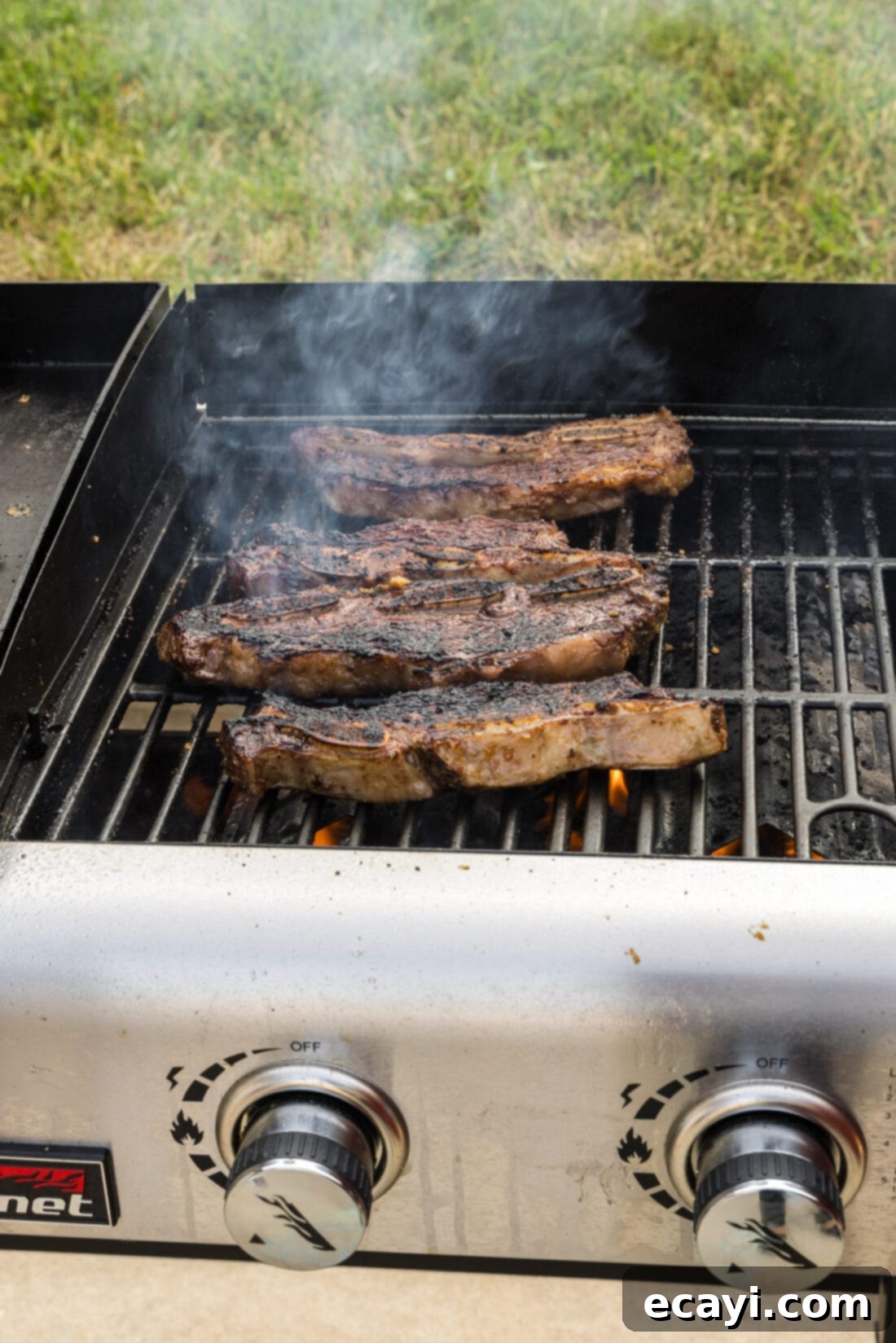
Delightful Serving Suggestions for Galbi
Korean short ribs are incredibly versatile and pair wonderfully with a variety of traditional Korean side dishes, creating a balanced and authentic meal. Serve your tender Galbi with a steaming bowl of fluffy white or brown rice to soak up all the delicious juices. Classic accompaniments include spicy and fermented kimchi, crisp bean sprouts, and blanched broccoli. For a refreshing crunch, consider a vibrant Asian broccoli salad or tangy pickled onions. Many enjoy wrapping the grilled short ribs in fresh lettuce leaves (ssam), often adding a dab of ssamjang (spicy dipping sauce) for an interactive and flavorful experience. Don’t forget to garnish your finished dish with a sprinkle of slivered green onions and toasted sesame seeds for added freshness and a pop of color.
More Mouthwatering Korean-Inspired Recipes
- Beef Bulgogi
- Korean Fried Chicken
- Soy Glazed Eggplant
- Smoked Beef Short Ribs
- Braised Beef Short Ribs
I love to bake and cook and share my kitchen experience with all of you! Remembering to come back each day can be tough, that’s why I offer a convenient newsletter every time a new recipe posts. Simply subscribe and start receiving your free daily recipes!
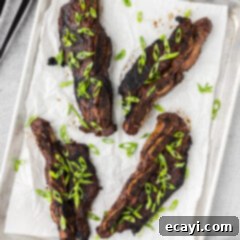
Korean Short Ribs (Galbi/Kalbi)
IMPORTANT – There are often Frequently Asked Questions within the blog post that you may find helpful. Simply scroll back up to read them!
Print It
Pin It
Rate It
Save ItSaved!
Ingredients
- 3 pounds beef short rib strips (flanken style is ideal)
Marinade
- ¾ cup soy sauce
- 3 Tablespoons sesame oil
- ¼ cup rice vinegar
- 3 Tablespoons minced garlic
- ¼ cup sliced green onion white ends only
- 1 cup coarsely chopped white onion
- 1 medium pear peeled, cored, coarsely chopped (Korean or Bosc/Anjou)
- ½ cup brown sugar packed
- 3 Tablespoons water
Things You’ll Need
-
Food processor or blender
-
Gallon sized zipper bag
-
Grill
-
Tongs
Before You Begin
- For authentic Galbi, select 3 pounds of beef short rib strips, also known as flanken ribs or flanken-style short ribs, which are thinly sliced across the bone.
- Korean pears are traditional for their tenderizing properties, but any ripe, sweet pear like Bosc or Anjou can be used as a substitute in the marinade.
- Ensure the marinade is completely smooth for optimal flavor distribution and tenderness.
- Marinate for at least 5 hours, or preferably overnight (10-12 hours), but avoid marinating for more than 24 hours to prevent the meat from becoming mushy.
- Leftover Korean short ribs should be stored in an airtight container in the refrigerator for 3-4 days.
Instructions
-
Combine all marinade ingredients (soy sauce, sesame oil, rice vinegar, minced garlic, green onion white ends, chopped white onion, peeled/cored/chopped pear, brown sugar, and water) in a blender or food processor. Process until the mixture is completely smooth with no chunks remaining.
-
Place the beef short rib strips into a plastic gallon zip-top bag. Pour the prepared marinade over the ribs. Seal the bag, ensuring all air is pressed out, and gently massage to coat the ribs evenly. Refrigerate and marinate for a minimum of 5 hours or preferably overnight (up to 12 hours) for best flavor and tenderness.
-
Preheat your grill to medium-high heat (approximately 375°F / 190°C) until the grates are good and hot.
TIP – To prevent sticking, oil your grill grates. Use tongs to hold a wadded-up paper towel, dip it in cooking oil (olive or vegetable), and rub it across the hot grates several times.
-
Remove the marinated ribs from the bag, allowing excess marinade to drip off. Place the rib strips onto the hot grill. Cook for 8-10 minutes on one side, then use tongs to flip them over. Cook for an additional 8-10 minutes on the second side, or until beautifully caramelized and tender. For more even cooking and char, you may flip them every 4-5 minutes.
Nutrition
The recipes on this blog are tested with a conventional gas oven and gas stovetop. It’s important to note that some ovens, especially as they age, can cook and bake inconsistently. Using an inexpensive oven thermometer can assure you that your oven is truly heating to the proper temperature. If you use a toaster oven or countertop oven, please keep in mind that they may not distribute heat the same as a conventional full sized oven and you may need to adjust your cooking/baking times. In the case of recipes made with a pressure cooker, air fryer, slow cooker, or other appliance, a link to the appliances we use is listed within each respective recipe. For baking recipes where measurements are given by weight, please note that results may not be the same if cups are used instead, and we can’t guarantee success with that method.
